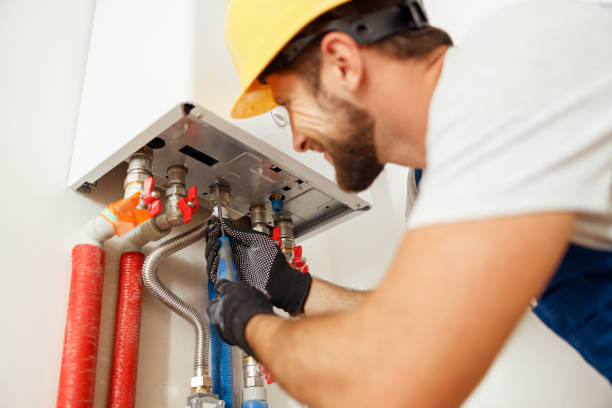Heating Repair Lithia, FL

When your heating system fails in Lithia, our expert repair services quickly restore comfort. We diagnose and fix common furnace problems like insufficient heat or strange noises, and resolve heat pump issues such as blowing cold air or excessive ice. Our meticulous process includes thorough diagnostics, transparent explanations, and quality repairs. We also help homeowners decide whether to repair or replace their system, considering age, frequency of repairs, and energy efficiency, ensuring your Lithia home stays warm and safe.

Expert Heating Repair for Your Lithia Home
When your heating system fails during a Florida cold snap, the comfort and safety of your home are immediately compromised. A sudden drop in temperature is more than an inconvenience; it’s a disruption to your life. For residents in Lithia, a malfunctioning furnace or heat pump requires a swift, professional response. Our dedicated heating repair services are designed to address these urgent needs, restoring warmth and peace of mind with expertise and efficiency. We understand the unique demands of Florida’s climate and are equipped to handle any heating challenge your system presents, ensuring you are not left in the cold.
Identifying Common Furnace Problems
Gas and electric furnaces are reliable workhorses, but they are not immune to mechanical issues. Recognizing the signs of a problem early can prevent more significant damage and costly repairs down the line. Our technicians are adept at diagnosing and resolving a wide array of furnace malfunctions.
Signs Your Furnace Needs Professional Attention:
- Insufficient or No Heat: The most obvious sign of a problem is a furnace that runs but fails to produce warm air, or any air at all. This can stem from thermostat issues, a faulty ignitor, or problems with the fuel supply.
- Unusual Noises: Furnaces should operate with a consistent, low hum. Loud banging, popping, or screeching noises often indicate serious mechanical problems, such as a loose component, an issue with the blower motor, or ductwork problems.
- Strange Odors: A faint burning smell when you first turn on the heat for the season can be normal as dust burns off. However, a persistent smell of burning plastic, electrical wiring, or a strong scent of gas is a serious warning sign that requires immediate attention.
- Frequent Cycling: If your furnace turns on and off in short, frequent bursts, this is known as short cycling. It can be caused by a clogged filter, an improperly sized unit, or a faulty thermostat, leading to inefficient heating and increased wear on components.
- Pilot Light Issues: For older gas furnaces, a pilot light that is yellow instead of blue, or one that repeatedly goes out, indicates a problem with the gas supply or thermocouple that needs to be addressed for safe operation.
Diagnosing and Repairing Heat Pump Malfunctions
Heat pumps are an excellent all-in-one solution for Florida homes, providing both heating and cooling. When they falter in heating mode, it requires specialized knowledge to diagnose the root cause. Our team possesses deep expertise in the complex mechanics of heat pump systems.
Common Heat Pump Issues We Resolve:
- Blowing Cold Air in Heat Mode: This frustrating issue can be caused by several factors, including low refrigerant levels, a malfunctioning reversing valve (the component that switches between heating and cooling), or an issue with the outdoor unit's defrost cycle.
- Excessive Ice on the Outdoor Unit: While a thin layer of frost is normal during a defrost cycle, a unit that becomes encased in a thick layer of ice is not operating correctly. This can point to restricted airflow, low refrigerant, or a faulty defrost control board.
- Constant Operation: A heat pump that runs continuously without reaching the set temperature is struggling. This could be due to an undersized unit, a refrigerant leak, or a failing compressor, all of which lead to sky-high energy bills.
- Grinding or Squealing Noises: Like furnaces, heat pumps should operate quietly. Grinding sounds often suggest failing motor bearings, while squealing can indicate a belt issue or other internal component problem.
Our Meticulous Heating Repair Process
When you need a repair, you deserve a service experience that is clear, professional, and effective. Our approach is built on a foundation of technical expertise and a commitment to customer satisfaction, ensuring a smooth process from the moment you reach out.
First, our team responds to your service request with the urgency it deserves, especially in emergency situations. A certified technician arrives at your Lithia home equipped with advanced diagnostic tools to perform a thorough inspection of your heating system. We don't guess; we identify the precise cause of the malfunction.
Once the problem is diagnosed, our technician will explain the issue in clear, understandable terms. You will receive a complete overview of the necessary repairs and the work involved before any repairs begin. This transparent approach ensures you are fully informed and confident in the proposed solution. With your approval, our expert will proceed with the repair, using high-quality parts and industry-best practices to ensure a durable, long-lasting fix. After the repair is complete, we perform a full system test to verify that your furnace or heat pump is operating safely, efficiently, and at peak performance.
Making an Informed Decision: Repair or Replace?
A significant system failure often leads to a critical question: is it more sensible to repair the unit or invest in a new one? We help homeowners navigate this decision by providing honest, data-driven advice. A useful guideline is the "$5,000 Rule." Simply multiply the cost of the repair by the age of your system in years. If the total exceeds $5,000, replacement is often the more financially sound option over the long term.
However, other factors are equally important:
- System Age: In Florida, a well-maintained heat pump typically lasts 10-15 years, while a furnace can last 15-20 years. If your unit is approaching the end of its expected lifespan, a major repair might only be a temporary fix.
- Frequency of Repairs: If you find yourself scheduling repairs every season, the cumulative cost can quickly approach the price of a new, reliable system.
- Energy Efficiency: Older systems are significantly less efficient than modern units. A new, high-efficiency system can provide substantial savings on your monthly energy bills, helping to offset the initial investment.
- Performance and Comfort: If your current system struggles to maintain consistent temperatures or operates loudly, a new unit can dramatically improve your home's overall comfort.










